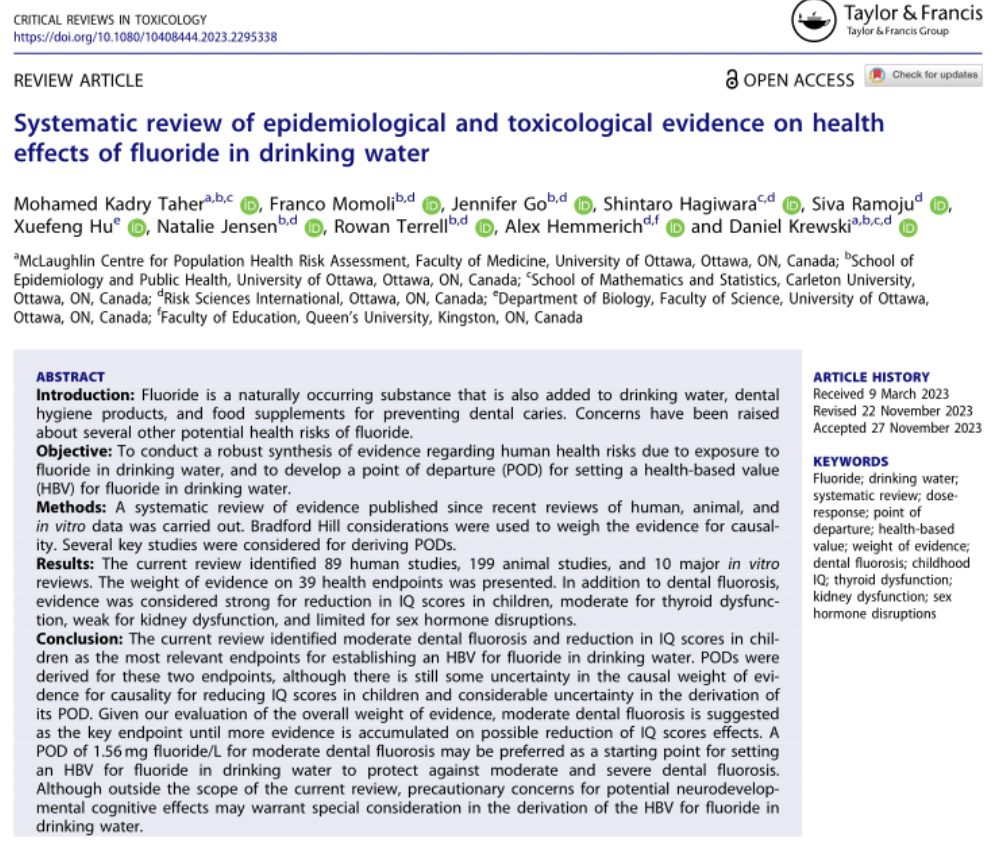Nebraska Bill Would Require Cities to “Opt-in” to Fluoridation

A bill that would reverse the state mandate for water fluoridation in Nebraska, and would require referendum approval to initiate fluoridation, has been introduced to the Nebraska legislature.
Legislative Bill 1387, introduced by State Sen. Ben Hansen of Blair, would set up a referendum vote on whether communities should add fluoridation chemicals to their water supply. In 2008, the Legislature mandated fluoridation for certain cities, with an opt-out option, according to the Nebraska Examiner on February 20th.
“The key message here is: A cavity can be filled, but damage to the brain is permanent and lifelong,” Hansen said.
In considering testimony on the bill, Sen. Hansen expressed frustration that fluoridation advocates who want to keep the state mandate failed to respond to the recent National Toxicology Program report that found prenatal exposure to fluoride in water is associated with reduced intelligence as measured in IQ tests.
“This isn’t Bob’s research facility in his basement — this is the government,” Hansen said.
British Study: Fluoridation Doesn’t Help Individuals

An analysis of National Health Service (NHS) dental records for over 6 million matched fluoridated and non-fluoridated English patients has led investigators from the University of Manchester to conclude, “Receipt of optimal water fluoridation in England 2010-2020 resulted in very small positive health effects, which may not be meaningful for individuals.”
The LOTUS study (fLuOridaTion for adUltS), published recently in Community Dentistry and Oral Epidemiology, concluded that NHS dental treatment costs for optimally fluoridated patients were 22.26 British pounds per person lower compared to the non-fluoridated patients, but the authors did not take into account the cost of repairing dental fluorosis that is necessarily caused by water fluoridation schemes. As with many cost studies of this kind, the authors ignored Ko and Thiessen’s 2015 report, “A critique of recent economic evaluations of community water fluoridation,” that appeared in the International Journal of Occupational and Environmental Health, and that concluded, “Incorrect handling of dental treatment costs and flawed estimates of effectiveness lead to overestimated benefits. The real-world costs of water treatment plants and communities are not reflected. Minimal correction reduced the savings to $3 per person per year (PPPY) for a best-case scenario, but this savings is eliminated by the estimated cost of treating dental fluorosis.”
Remarkably, the LOTUS study authors reported that they found “no compelling evidence that water fluoridation reduced social inequalities in dental health,” historically the main selling point for water fluoridation schemes.
The claims of large scale benefits from fluoridation that have also accompanied efforts to add fluoride to drinking water, were also not supported by this study.
“In high-income countries with widespread access to topical fluorides, water fluoridation may now represent a classic ‘prevention paradox’; a preventive measure, which can bring benefits for populations and services but ‘offers little to each participating individual’. This is in contrast to the historic studies which identified absolute differences in caries severity of 50%–60%,” wrote the authors.
In the end, the British investigators felt the need to draft fluoride’s epitaph, writing, “There is no doubt that population-level, ‘mass preventive’ interventions for dental caries are still required. Dental caries remains almost universal by adulthood, even in populations that have had access to fluoride toothpastes and fluoridated water from birth. However, in high-income countries, we may be reaching the limit of what can be achieved through fluorides alone. A dose–response relationship between free sugars and dental caries is evident at all levels of intake above zero, and fluorides merely attenuate this relationship.”
Read FAN’s Detailed bulletin on the Lotus Study
Source: https://doi.org/10.1111/cdoe12930
New Zealand judge orders Ministry of Health Director-General to Reconsider Fluoridation Directives, Include Opponents’ Views

High Court Justice Paul Radich has reiterated his ruling that directives from the Ministry of Health requiring numerous councils in New Zealand to fluoridate their drinking water were unlawful, but has allowed them to stay in place as the Director-General of Health reassesses the directives to bring them into compliance with the Bill of Rights that prohibits most forced medication, according to Fluoride Free New Zealand.
The judge’s February 16th ruling requires the Ministry to assess whether the directives were in each case under the Bill of Rights, “reasonable limits on the right to refuse medical treatment prescribed by law as can be demonstrably justified in a free and democratic society.”
The plaintiff’s [New Health New Zealand] views on the issue are to be taken into account,” writes the judge.
“There is no time limit on this reassessment. So the Director-General could simply prevaricate and the directives would continue to stand,” writes Fluoride Free New Zealand. Councils are threatened with steep financial penalties if they don’t meet the deadlines for commencing fluoridation.
“Under this outcome, councils will likely continue to be scare-mongered into proceeding,” writes the New Zealand fluoride opposition group.
Source: https://fluoridefree.org.nz/wp-content/uploads/2024/02/New-Health-v-Attorney-General-relief.pdf
Report For Health Canada Finds “Strong Evidence” of Fluoride’s Neurotoxicity

A review commissioned by Health Canada, and published February 6 in Critical Reviews in Toxicology found “strong evidence” that water fluoridation could lower children’s IQ, according to a report in Calgary’s Western Standard February 19.
“The review found 17 studies from 2016 to 2022 of “of high or acceptable quality were identified, which reported a positive/possible association between reduced IQ scores and water fluoride,” reported the paper
“The cumulative body of evidence suggests a positive association of reduced IQ scores for children and fluoride exposures relevant to current North American drinking water levels,” reported the Health Canada study.
“The researchers calculated the hazard level or toxicological point of departure for observable effects of fluoride on IQ was 0.179 milligrams per liter (mg/L) in water. However, the authors said data at that low range had significant uncertainty and would benefit from further investigation,” according to the newspaper.
Source: https://doi.org/10.1080/10408444.2023.2295338
Union County, North Carolina Ends Water Fluoridation

The Union County Board of Commissioners voted 3 to 2 on February 20th to stop adding fluoridation chemicals to its Yadkin River Water Treatment Plant that serves about one-third of the county’s population (approx. 115,000 customers) citing the lack of informed consent with fluoridation.
According to WCNC reporting, “Union County Commissioner David Williams said the vote is not as much about the possible positives or negatives of continuing to add fluoride to the water system but giving the public the right to choose what goes in their water.”
“We add a lot of chemicals to our water to treat the water, and that’s a good thing,” Williams said. “But this is the one chemical we add to the water that isn’t meant to treat the water; it’s meant to treat us. And that’s something that we don’t consent to. So again, for me, it’s about freedom of choice, consent.”
NC Newsline reported, “Vice Chairman Brian Helms said the issue was not a matter of whether fluoride was good or bad in preventing dental disease. ‘The argument is if this board, the Union County Board of Commissioners, has the authority to put a medicine or a medical substance in our water without the consent of the residents,’ said Helms. ‘Do we have the the authority to do so? My opinion is that we do not.'”
•• Michael Dolan can be contacted at <mdolan.ecsn@outlook.com>
•• The archives of The Fluoridation Review are available at: https://
